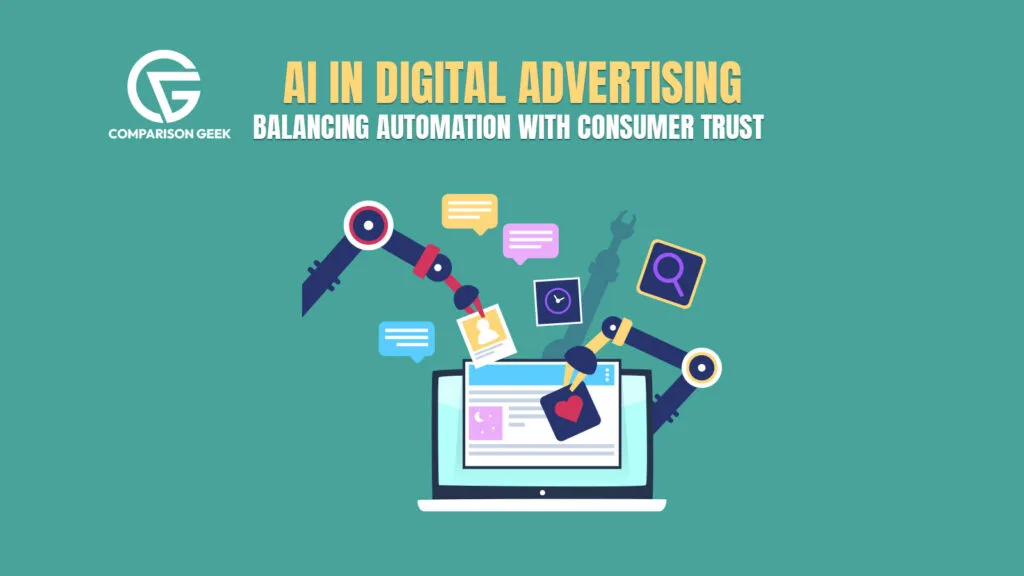Artificial Intelligence has become a significant cornerstone of digital advertising because it offers automation and data-driven precision. Its benefits are substantial, but so are its ethical implications. Balancing automation with consumer trust can ensure the long-term success of AI-powered campaigns.
Table of Contents
ToggleThe Role of AI in Transforming Advertising
AI automates tasks such as ad placements, audience segmentation, and performance tracking. They use enormous amounts of data that they analyze to understand user behavior, allowing marketers to deliver very personalized ads. The precision yields better engagement and ROI.
For example, AI will predict the people most likely to click on an advertisement based on browsing history or past interactions with ads. While overdependence on automation means overlooking ethics in terms of consumer privacy and transparency, among other factors.
Transparency:
A Foundation for Trust
Transparency is important in AI-driven advertising. Businesses need to tell the consumer how data is being collected, stored, and used. Clear communication of data practices reduces fears of misuse and fosters trust.
The Privacy-friendly features like opt-out options and detailed data policies empower users. Control over their information is a valued feature for consumers, and such options demonstrate a brand’s commitment to ethical practices.
Reducing Bias in AI Models
AI systems become as unbiased as the training data. Thus, where the training data contains prejudice, a campaign may accidentally promote stereotypes or exclude some sections of people. For example, an AI algorithm used on hire ads might target only some sections on age or gender.
Marketers should invest in diverse datasets and audit their AI systems periodically to remove biased outcomes. Human oversight adds further guarantee of fair outcomes besides reducing unintended errors in ad deliveries.
Striking a Balance Between Automation and Human Input
Efficiency can be enhanced through AI, but human involvement cannot be bypassed. The creativity and empathy that are part of true messaging cannot be automatically processed and optimized by AI. Marketers would have to work with AI to craft campaigns that were consistent with brand values and resonated with audiences.
Integrating AI-driven insights with creative powers, businesses can create intelligent campaigns that are as efficiency-driven as they are emotionally or creatively driven. This way, their campaigns do not become so robotic and are touched by a human aspect.
Using AI to Enhance Consumer Trust
AI can strengthen consumer trust when used responsibly. For instance, personalization may bring relevant content to consumers according to their preferences and thereby show them that the brands understand their needs. It should never be at the expense of privacy.
This also improves transparency by giving users real-time feedback, such as why they were shown a certain ad. Such practices promote openness and accountability, making the consumer feel valued and respected.
Ethics as a Competitive Advantage
Adopting ethical AI practices is a responsibility, but it is also an advantage. Brands that stand for transparency and fairness in this competitive market are going to be different. Ethical practices enhance reputation, increase customer loyalty, and reduce regulatory risks.
For example, if a company openly addresses its privacy concerns and puts up clear policies regarding data usage, it will gain more trust from the consumers. The trust results in stronger relationships and better business outcomes.
AI’s Role in Real-Time Campaign Optimization
One of the biggest advantages that digital advertising gets from AI is the optimization of campaigns in flight. Algorithms can review the data as they are aggregating it, and marketers could make real-time changes that then improve performance. It may just mean adjusting ad placements and budget adjustments and refining a target audience based on current results.
For example, if a given demographic for the campaign is performing poorly, AI will redistribute resources to those higher-performing segments. Similarly, AI may recognize patterns, such as peak engagement times, and modify ad delivery schedules accordingly to take full advantage of them. That way, this proactive optimization will give the maximum return on investment while minimizing waste and spending.
With real-time feedback mechanisms in place, businesses can become agile and respond accordingly to changing market dynamics and consumer behaviors. Agility is a highly important aspect of survival within the fast-paced world today because the ability to pivot quickly can make or break an advertising campaign.
Final Thoughts
AI has transformed digital advertising, with precision and automation that no human can offer. However, its success depends on how well it upholds ethical standards, including transparency, protection of privacy, and a decrease in biases. The balance between automation and human oversight ensures that campaigns remain effective and trustworthy. Top Comparisons & Reviews of AI tools and platforms can help marketers make informed decisions on the best options for ethical practices.
By embracing responsible AI, marketers will find lasting relationships with consumers through trust in the delivery of impactful campaigns. In this ever-evolving digital landscape, ethics in AI are no longer a choice, but rather a necessity for interacting meaningfully with your people.


